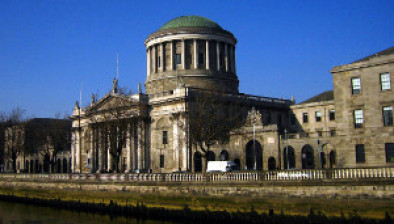Supreme Court: Appeal of decision to refuse passport to child born in Ireland dismissed

The Supreme Court has dismissed a mother’s appeal against the refusal by the minister for foreign affairs to grant an Irish passport to her child born in Ireland in 2019.

About this case:
- Citation:[2025] IESC 7
- Judgment:
- Court:Supreme Court
- Judge:Ms Justice Aileen Donnelly
Delivering judgment for the Supreme Court, Ms Justice Aileen Donnelly determined that while the appellant’s mother “was entitled to have her residence renewed successively after every three years, her entitlement to this renewal ceased if she lost her entitlement to subsidiary protection. She was therefore not a person whose period of residence was without any restriction.”
Background
The appellant child was born in the State in 2019, at a time when his mother held a declaration of subsidiary protection.
The appellant’s mother applied for an Irish passport for him, relying on the Irish Nationality and Citizenship Act 1956 (as amended) which grants citizenship to all born in Ireland subject to ‘reckonable residence’ requirements.
In particular, the appellant’s mother sought to rely on s.6A(2)(d)(i) of the 1956 Act, which disapplies reckonable residence requirements where a person is born to parents, at least one of whom was at the time of the birth entitled to reside in the State without any restriction on their period of residence (including in accordance with a permission granted under section 4 of the Act of 2004).
The application was rejected by the first respondent on the basis that s.6A(2)(d)(i) did not apply to persons having subsidiary protection, as they are subject to constraints on their period of residence such as the requirement to have continued eligibility for subsidiary protection.
The appellant’s mother argued that at the time of the appellant’s birth, she was entitled to reside in the State without any restriction on her period of residence as under s.53 and s.54 of the International Protection Act 2015, persons having subsidiary protection are given a permission to reside for a period which “shall be renewable unless compelling reasons of national security or public order…otherwise require” and which “shall cease to be valid where the person to whom it was given ceases to be a qualified person or a family member, as the case may be”.
The High Court
The appellant unsuccessfully appealed to the High Court, which held that the right to reside in the State pursuant to a grant of subsidiary protection is for a temporally restricted period subject to conditions, and that the renewal of same was subject to two express possibilities — the requirement of compelling reasons of national security or public order, or the cessation of a person’s subsidiary protection status.
The High Court also rejected inter alia the proposition that AJK v The Minister for Defence [2020] IECA 64, [2020] 2 IR 800 is authority for the fact that the appellant’s mother had “an open-ended right of residence” which was not restricted, distinguishing AJK on the basis that while membership of the Defence Forces can be revoked for reasons of national security or public order, a right to citizenship by virtue of s.6A(2)(d)(i) is a status which cannot be revoked by the State.
The appellant appealed to the Supreme Court.
The Supreme Court
Ms Justice Donnelly noted that the central issue in the appeal was the meaning of the phrase “any restriction on the period of residence” contained in s.6A(2)(d)(i) of the 1956 Act.
The judge considered the historical context of s.6A, considering the 27th amendment of the Constitution in 2004 which provided that “a person born on the island of Ireland, which includes its islands and seas, who does not have, at the time of the birth of that person, at least one parent who is an Irish citizen or entitled to be an Irish citizen is not entitled to Irish citizenship or nationality, unless provided for by law”.
The court highlighted that the legislative response by way of the Irish Nationality and Citizenship Act 2004, which substantially amended the 1956 Act, represented “a policy choice by the legislature to grant birthright citizenship in certain other circumstances but not to grant it in relation to everyone born in the island of Ireland”.
Having considered, inter alia, the Refugee Act 1996, the British-Irish Agreement and the British Nationality Act 1981, the judge reasoned that the period of the residence for the purposes of s.6A must be ‘without any restriction’, “a broad phrase; the use of the word ‘any’ connotes that ‘restriction’ can come in a variety of means. In plain language that means there must be no restriction which would limit the period of residence for which the person is entitled to reside”.
Mr Justice Donnelly emphasised that the residence status referred to is conferred by the operation of immigration laws and procedures, and that immigration permissions “are often, indeed usually, restricted as to time and condition e.g. a work or student permission (Stamp 1/Stamp 2)”.
The judge continued: “It would be unusual if s. 6A(2)(d)(i) was only to apply to a restriction of time and not to any other condition which restricts the period. Thus, the two separate parts of the phrase ‘any restriction’ and ‘period of residence’ taken together do not compel a meaning that a restriction must only be a facially temporal one without regard to any restriction which might lead to the period coming to an end when a particular condition is no longer met.”
In response to the appellant’s submissions that such an interpretation would be absurd where an irrevocable permission to reside could not exist at law, the Supreme Court highlighted that “s. 6A(2)(d)(i) must have contemplated a situation where the right of residence was non-absolute as a matter of law. In that circumstance, the subsection must refer to a residence which is nevertheless prima facie without limit as to duration or condition; that is, a putatively permanent residence i.e., a period of residence without any restriction.”
The court was satisfied that on its plain and ordinary meaning and in light of its historical, legislative and international context, s.6A(2)(d)(i) means that only those whose period of residence is putatively permanent can give birthright citizenship to their children born in the island of Ireland.
Ms Justice Donnelly concluded: “The applicant’s mother, as a person who was entitled to a declaration of subsidiary protection, was not a person who was entitled prima facie to a period of residence without restriction as to time or condition.”
Conclusion
Accordingly, the Supreme Court dismissed the appeal.
TRI (a minor) v The Minister for Foreign Affairs and the Minister for Justice [2025] IESC 7









